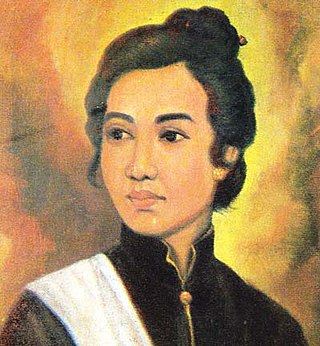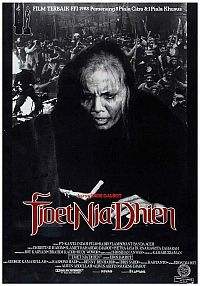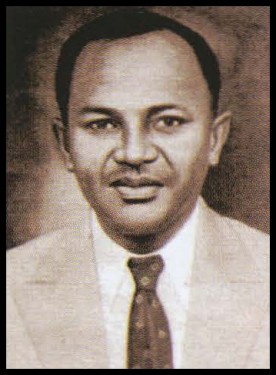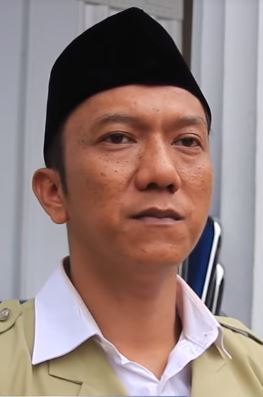
The Aceh War, also known as the Dutch War or the Infidel War (1873–1904), was an armed military conflict between the Sultanate of Aceh and the Kingdom of the Netherlands which was triggered by discussions between representatives of Aceh and the United States in Singapore during early 1873. The war was part of a series of conflicts in the late 19th century that consolidated Dutch rule over modern-day Indonesia.

Joannes Benedictus "Jo" van Heutsz was a Dutch military officer who was appointed governor general of the Dutch East Indies in 1904, years after he had become famous for bringing to an end to the long Aceh War.

Teuku Umar was a leader of a guerrilla campaign against the Dutch in Aceh during the Aceh War. He died when Dutch troops launched a surprise attack in Meulaboh. His body was buried in the Mugo area. Afterward, his wife Cut Nyak Dhien continued to lead the guerrillas. He was later made a Pahlawan Nasional Indonesia.

Pidie Regency is a regency of Aceh Special region, in Indonesia. It is located in the north of the island of Sumatra, in Western Indonesia, bordered by the Malacca Strait and Pidie Jaya Regency in the north, Aceh Besar Regency in the west, Bireuen Regency in the northeast, and Aceh Jaya Regency in the south. The regency covers an area of 3,184.46 square kilometres and had a population of 379,108 people at the 2010 Census and 435,275 at the 2020 Census; the official estimate as at mid 2023 was 448,085 - comprising 223,208 males and 224,877 females. Pidie was the largest rice-producing area of Aceh province, producing some 20% of its total output.

Teungku Mohammad Daud Beureueh was an Indonesian military Governor of Aceh (1945–1953) and leader of the Darul Islam rebellion in the province (1953–1963).

Zakariya is a masculine given name, the Arabic form of Zechariah which is of Hebrew origin, meaning "God/YHWH has remembered".

Tjoet Nja Meuthia, also known as Tjut Meutia or Cut Meutia, was an Indonesian national hero.

Tjoet Nja' Dhien is a 1988 Indonesian film directed by Eros Djarot and starring Piet Burnama, Christine Hakim, Rudy Wowor, and Slamet Rahardjo. Based on the life's story of female Acehnese guerrilla leader Cut Nyak Dhien, it focuses on the six-year period between her second husband, Teuku Umar's death and her capture by the Dutch colonial army. Tjoet Nja' Dhien was released to critical acclaim, winning 9 Citra Awards, and was screened at the Selection de la Semaine de la Critique in Cannes, 1989. It also became Indonesia's submission to the 62nd Academy Awards for the Academy Award for Best Foreign Language Film, but was not nominated.

The Acehnese, also written as Atjehnese and Achinese, are an indigenous ethnic group native to Aceh, Indonesia on the northernmost tip of the island of Sumatra. The area has a history of political struggle against the Dutch colonial rule. The vast majority of Acehnese people are Muslims. The Acehnese people are also referred to by other names such as Lam Muri, Lambri, Akhir, Achin, Asji, A-tse and Atse. Their language, Acehnese, belongs to the Aceh–Chamic group of Malayo-Polynesian of the Austronesian language family.

Cut Nyak Dhien was a leader of the Acehnese guerrilla forces during the Aceh War. Following the death of her husband Teuku Umar, she led guerrilla actions against the Dutch for 25 years. She was posthumously awarded the title of National Hero of Indonesia on 2 May 1964 by the Indonesian government.

Achmad Soebardjo Djojoadisoerjo was a diplomat, an Indonesian national hero, and the first foreign minister of Indonesia.

Shireen Sungkar is an Indonesian actress and singer of Arabic and Minangkabau descent. She is the daughter of Indonesian actors Fanny Bauty and Mark Sungkar.

A kupiah is a cap that originates from Aceh, Indonesia. There are two types: kupiah meukeutob and kupiah riman. Kupiahs are worn by Acehnese men as an everyday wear or specifically in ceremonies such as in a wedding.

Teuku Nyak Arif was an Acehnese nationalist and National Hero of Indonesia. He has been given the nickname Rencong of Aceh, after the traditional Acehnese weapon, for his bravery.

Aceh State Museum, popularly known as Aceh Museum or Banda Aceh Museum is a museum in Banda Aceh, Indonesia. It is one of the oldest museum in Indonesia.

Teuku Rifnu Wikana is an Indonesian actor of Acehnese descent. He became famous after starring in the films 9 Naga and Mendadak Dangdut in 2006. He was born in Pematangsiantar, North Sumatra.

The Indonesian Malaysians are Malaysian citizens of Indonesian ancestry. Today, there are many Malaysian Malays who have lineage from the Indonesian archipelago and have played an important role in the history and contributed to the development of Malaysia, they have been assimilated with other Malay communities and are grouped as part of the foreign Malays or anak dagang in terms of race. The Malaysian census does not categorize ethnic groups from the Indonesian archipelago as a separate ethnic group, but rather as Malay or Bumiputera.

Abd al-Rauf ibn Ali al-Fansuri al-Sinkili was a renowned Islamic scholar, spiritual leader of the Shattariyya tariqa and mufti of the Aceh Sultanate. He was a confidant of Sultana Safiat al-Din and first to spread the Shattari Sufi order in Indonesia and Southeast Asia. Many of his students became disseminators of Islam. He is commonly known as Sheikh Abd al-Rauf al-Sinkili and posthumously as Teungku Syiah Kuala.
Teuku Iskandar was an Indonesian scholar, literary critic, lexicographer, historian, and nobleman. He was one of the native Indonesians of Acehnese who were eager to revivify the historical records of the indigenous civilizations of the Indonesian island of Sumatra. In the modern days, Teuku Iskandar considered as the linguistic father of Standard Malay, a standardized form of Malay which heavily based on the Standard Indonesian linguistic elements.

















